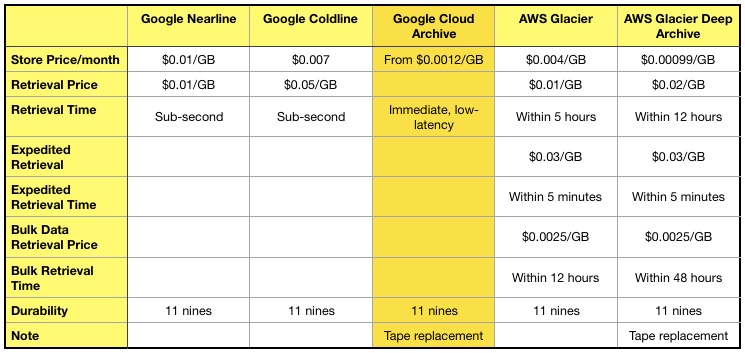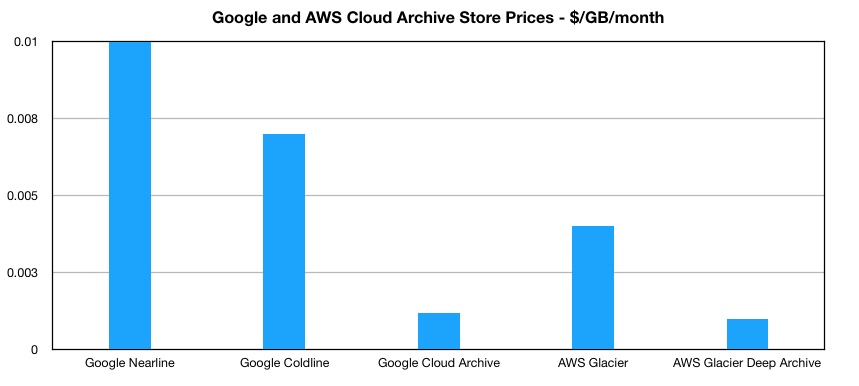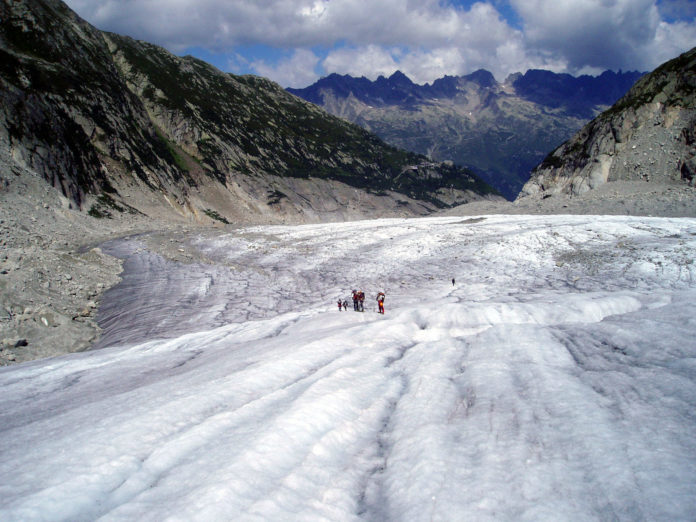Google is prepping a deep cloud archive service to replace tape storage and says users can anticipate fast access. By contrast Amazon quotes up to retrieval time of up two days for Glacier Deep Archive.
In a blog Google product marketing directors Dominic Preuss and Dave Nettleton revealed the cold storage news in a blog. The intent is to replace tape and provide fast access, like Google’s existing Nearline and Coldline cloud storage options, Preuss and Nettleton wrote.
“Unlike tape and other glacially slow equivalents, we have taken an approach that eliminates the need for a separate retrieval process and provides immediate, low-latency access to your content.”
That means the service will be faster than AWS Glacier’s expedited retrieval within five minutes.
Finder’s Fees
The coming cloud archive storage class starts at $0.0012 per GB per month ($1.23 per TB per month.) No retrieval pricing is provided but we have enough data to build a table that compares AWS and Google cloud archive options.

The planned Google cloud archive storage prices falls between Amazon Glacier and Glacier Deep Archive. Here is an at-a-glance comparison.

Note, Google has not yet published retrieval pricing and the Preuss and Nettleton imply there will be more than one Cloud Archive storage class. Blocks & Files infers that, as with AWS, this could mean class differentiation by retrieval time.
Google said there is full integration into its object lifecycle management so customers can tier cold objects down to the Cloud Archive to lower total cost of ownership. Data in Cloud Storage is always redundantly stored across availability zones with 11 9’s annual durability (99.999999999 per cent.)
The Google Cloud Archive will be available later this year.
More Google Cloud news
- Cloud Filestore, the managed file storage service is generally available with faster read performance for premium instances – up to 60,000 IOPS and 1.2GB/sec throughput
- Regional Persistent Disks provide active-active replication across two zones in a region and will be generally available in the week beginning April 15.
- Persistent Disk throughput limits have been raised to 240 MB/sec for writes, and 240 MB/sec for reads. A VM can have up to 128 Persistent Disks.
- Bucket Policy-Only lets users enforce Cloud Identity and Access Management (IAM) policies at the bucket level for consistent and uniform access control, It is in beta test.
- V4 signature support adds authentication data to cloud requests. Customers can access multiple object stores using the same application code. It is in beta test.
- Cloud IAM roles, custom ones, and permissions in Cloud Storage Transfer Service are now generally available.
Read the blog for pointers to further information.








